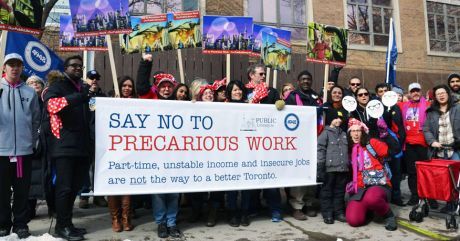News
You are here
Toronto Library workers: strike threat and community support pushes concessions off the table

May 11, 2016
Toronto Library workers in CUPE 4948 stared down all the concessions that Mayor John Tory was attempting to extract in recent contract negotiations. Library workers called the mayor’s bluff, signalling their readiness to hit the picket lines on the May 2 deadline if the city didn’t come up with a better offer.
CUPE local 4948 president Maureen O’Reilly characterized this round of negotiations as no different than the last time in 2012 when Rob Ford was mayor and library workers struck. The city was asking for major concessions including, mandatory Sunday shifts at straight time for full timers and two-tiered job security for part timers. The union indicated it was willing to go on strike if either of these two issues remained on the table. Both were struck in the final offer.
Resisting concessions from Ford to Tory
In 2012, the library workers were the only municipal workers that managed to resist Ford’s attack on city workers. They hit the picket lines after building a big campaign that engaged the library-loving public, including Margaret Atwood, with rallies, regular communications and public read-ins. The strike pushed Ford off his game and many concessions, although not all, came off the table, unlike the situation for other city workers in CUPE 416 and 79.
In 2016, library workers started on a more confident and pro-active footing, fighting for gains at the bargaining table, and reactivating the networks with library supporters from the 2012 strike. Margaret Atwood again weighed in to support with her million twitter followers, the union held a Teddy Bear picket at Nathan Phillips square that brought out library supporters and their families.
While Tory was able to once again squeeze concessions out of inside and outside workers in CUPE 416 and 79, library workers successfully fought off all concessions. This is rare a victory and breaks the pattern of insidious erosion in which huge initial concessions and wage freezes offered by the employer are whittled down to smaller ones with miniscule wages increases.
There have been other recent examples of building new resistance on previous success. Chicago teachers held a one-day strike in April calling for more funding for education. The confidence to build a strike on a political demand and not just an economic demand is a result of the base of support built in the successful strike in 2012.
Quebec public sector workers also pushed back concessions in a recent series of strikes, including the largest general strike in Quebec history on December 9. This was built, in part, on the success of the student strike in 2012.
What Toronto library workers, Chicago teachers and Quebec public sector example show is that when unions organize effective campaigns to engage members and the community they can directly challenge employers’ attacks.
Section:









